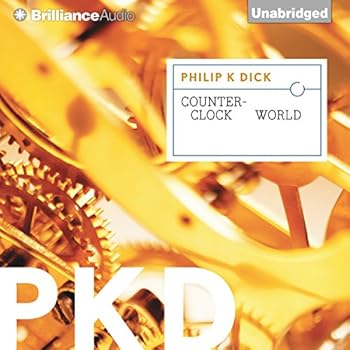![]() Counter-Clock World by Philip K. Dick
Counter-Clock World by Philip K. Dick
 It’s 1998 and time has started running backward. Aging has reversed so that people are gradually getting younger, and dead people are awakening in their graves and begging to be let out. The excavating companies have the rights to sell the people they unbury to the highest bidder. When Sebastian Hermes’s small excavating company realizes that Thomas Peak, a famous religious prophet, is about to come back to life, they know that getting to him first could be a huge boon to their business. The problem is that there are other organizations that prefer for Thomas Peak to stay dead, especially when they realize he may have information about the afterlife.
It’s 1998 and time has started running backward. Aging has reversed so that people are gradually getting younger, and dead people are awakening in their graves and begging to be let out. The excavating companies have the rights to sell the people they unbury to the highest bidder. When Sebastian Hermes’s small excavating company realizes that Thomas Peak, a famous religious prophet, is about to come back to life, they know that getting to him first could be a huge boon to their business. The problem is that there are other organizations that prefer for Thomas Peak to stay dead, especially when they realize he may have information about the afterlife.
Philip K. Dick is in a class of his own and it’s hard to compare his novels to anyone’s but his own. Maybe it’s not fair, but there are certain expectations we have for other novelists that don’t apply when we read PKD. Most importantly, we can’t expect the plot to always make sense. This is most true, I think, when Dick shows us a future United States of America which we know could never happen. For example, in Counter-Clock World, we can’t let it bother us that an excavating company has the rights to sell people it digs up and that nobody, including the resurrected people and their relatives, question this. Or that the public library system has the authority to eradicate important works of arts and literature. Or that some things work backwards (people disgorge their food instead of eating it, they say “goodbye” when they answer the phone and “hello” when they hang up, and cigarettes get longer when they’re smoked) — but most things (like walking, driving, and talking) don’t. None of it makes sense, but you just have to go with it and, if you can’t, you shouldn’t be reading Philip K. Dick.
So, compared to some of his other novels, Counter-Clock World, published in 1967, does pretty well. It’s got the usual wacky premise, annoying abbreviations (’pape” for newspaper, “pilg” for pilgrimage, etc), bad marriages, robots, drug trips (only one short one this time), and plenty of paranoia, but the plot holds together well (once you agree to the premise), it’s fast-paced, amusing, and, most importantly, not confusing.
 There’s usually a religious theme in PKD’s work, but it’s a particular focus in Counter-Clock World. He has some interesting thoughts about death, resurrection, pride, and humility. As usual, I find it disappointing, and somewhat sad, that Dick imagined all sorts of sophisticated technology for 1998 but assumed that we would not have progressed in the areas of civil rights for blacks and women. We have further to go in these areas, but it’s disturbing that Dick did not foresee our social progress. In fact, most of his work, like much science fiction from the 1960s, assumes a degradation of American culture that, fortunately, we have not seen.
There’s usually a religious theme in PKD’s work, but it’s a particular focus in Counter-Clock World. He has some interesting thoughts about death, resurrection, pride, and humility. As usual, I find it disappointing, and somewhat sad, that Dick imagined all sorts of sophisticated technology for 1998 but assumed that we would not have progressed in the areas of civil rights for blacks and women. We have further to go in these areas, but it’s disturbing that Dick did not foresee our social progress. In fact, most of his work, like much science fiction from the 1960s, assumes a degradation of American culture that, fortunately, we have not seen.
Patrick Lawlor did an absolutely perfect job with the narration of Brilliance Audio’s production which has just been released. His clear strong voice is attractive, his male and female voices were spot-on, and he managed to get the paranoia and frenzy across without annoying me. I can’t wait to listen to more of Patrick Lawlor.



It would give me very great pleasure to personally destroy every single copy of those first two J. J. Abrams…
Agree! And a perfect ending, too.
I may be embarrassing myself by repeating something I already posted here, but Thomas Pynchon has a new novel scheduled…
[…] Tales (Fantasy Literature): John Martin Leahy was born in Washington State in 1886 and, during his five-year career as…
so you're saying I should read it? :)